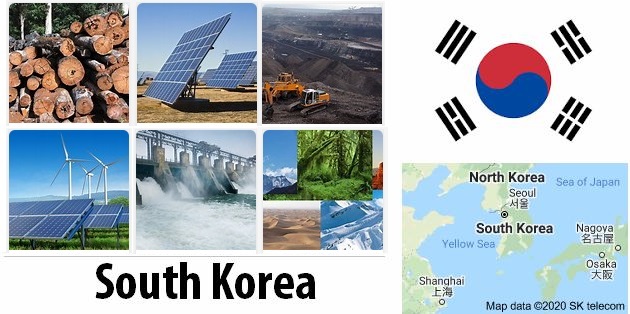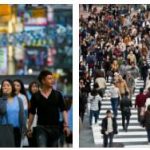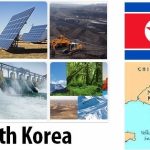Natural resources and energy
South Korea has no known oil deposits of greater value and is also poor on other minerals. Coal is the country’s foremost mineral resource. The breaking of tungsten used to have some economic significance. There are minor occurrences of lead, zinc, copper, kaolin and feldspar.
Oil imports are significant. In order to reduce the import of raw materials and fuel to the industry, South Korea has started joint ventures with foreign companies to extract minerals in resource-rich countries such as Australia, Canada and Indonesia.
- COUNTRYAAH: Major exports by South Korea with a full list of the top products exported by the country. Includes trade value in U.S. dollars and the percentage for each product category.
South Korea has also invested heavily in nuclear power to reduce oil dependency. Nuclear power contributes about a third of the electricity consumed in the country.
The rest of the energy is produced using oil, coal and a small amount of hydropower. South Korea is one of the world’s largest importers of liquefied natural gas. South Korea has long hoped for a pipeline to be built that can deliver Russian gas from Siberia via North Korea.
- Abbreviationfinder: A popular acronym site in the world covering abbreviation for each country. For example, KR stands for South Korea. Visit itypeusa for more information about South Korea.
FACTS – ENERGY AND ENVIRONMENT
Energy use per person
5,456 kilograms of oil equivalent (2015)
Electricity consumption per person
10564 kWh, kWh (2014)
Carbon dioxide emissions in total
587 156 thousand tons (2014)
Carbon dioxide emissions per inhabitant
11.6 tonnes (2014)
The share of energy from renewable sources
2.7 percent (2015)
2018
November
Tangerines against mushrooms
November 12
North and South Korea exchange food gifts with each other, as evidence of the new, warmer relations between the states. In September, North Korea’s Kim Jong-Un sent two tons of the exclusive mushroom goliath mushroom to families in South Korea that were split from their North Korean relatives during the war. South Korea replies in November with sending 200 tons of mandarins to North Korea.
Support for road and rail construction in North Korea
November 8
President Moon has offered North Korea assistance in upgrading its backlog infrastructure. The equivalent of 295 million won (about $ 264 million) will be spent on building new railways and roads and improving old ones and on connecting them with South Korea.
October
Panmunjom free from weapons and military guards
October 25th
As part of an agreement between Kim Jong-Un and President Moon from September, weapons and military guards are removed from the “Peace Village” Panmunjom, an area also called the JSA (Joint Security Area) where meetings are often held between the two Korean sides as well as representatives for the United Nations military operation during the Korean War (UNC, United Nations Command). Earlier in the autumn, some 800,000 landmines along the border had also been removed.
Prison for 15 years for former president
October 5
South Korea’s former president Lee Myung-Bak is sentenced to 15 years in prison for corruption, bribery and abuse of power by a Seoul court. According to the court, he owned a company that was used for money laundering and received bribes from the electronics company Samsung. Lee will also have to pay 13 billion won or 10 million euros in fines. Lee, who was president in 2008-2013, is the fourth former president of the country to receive a prison sentence.
September
New summit between North and South Korea
September 19
North Korea’s leader Kim Jong-Un and President Moon hold talks for the third time. During the meeting, which takes place in Pyongyang, the two leaders reiterate the pledges of peace and that the Korean peninsula should be nuclear-free. Kim Jong-Un also promises to close the Tongchang-ri robot testing facility.
Cooperation office for Korean relations
September 13
A co-operation office to contribute to better relations between North and South Korea and facilitate communication and exchange. South Korea’s and North Korea’s reunification ministers participate in the inauguration of the institute, which will consist of 20 officials from each country. The institute is based in the industrial zone in Kaesong.
August
President Park’s imprisonment is extended
August 24th
Former President Park Geun-Hye gets his prison sentence for abuse of power and corruption extended by one year. She was sentenced in April to spend 24 years in prison. In another separate trial in July, she was punished with eight years in prison.
Meetings between divided families
20th of August
For the first time in three years, South and North Korea are organizing reunions between Korean families that split after the Korean War. 83 North Koreans and 89 South Koreans have been selected this time, which is the 18th row of reunification meetings organized over the years. Many of the participants are old and no longer have their closest family members in life, but instead it is about meeting cousins or other relatives.
July
New prison sentence for Park Geun-Hye
July 20
Former President Park Geun-Hye is sentenced to eight more years in prison for corruption. She must have received illegal contributions from the South Korean intelligence service and influenced the elections. Park is already serving a 24-year prison sentence for, among other things, abuse of power. She has constantly denied crimes and believes that the trials are politically motivated.
June
Tighter rules for asylum seekers from Yemen
June 30th
Protests have erupted as hundreds of Yemenis have made their way to South Korea from Yemen, via the tourist island of Jeju, to seek political asylum in the country. Half a million South Koreans have signed on a list of names calling on President Moon Jae-In to expel asylum seekers. People who have moved to the country from North Korea are entitled to South Korean citizenship, but only a fraction (just over 4 percent) of the 40,000 people from other countries who have sought asylum in the country since 1994 have been granted it. No visa has been required to visit Jeju, but the government has now abandoned visa waivers for Yemenis. YemeniCitizens have also been prohibited from traveling from the island to the South Korean mainland. The government also announces a legislative amendment that will shorten the asylum process, which can often extend over time for several years.
Military exercises with the US are stopped
June 18
The government confirms that military exercises with the US will be interrupted, as promised by US President Trump at the historic meeting with North Korea’s leaders in Singapore a week earlier. The first exercises set would have been held in August, when over 17,000 American soldiers would have participated.
Success for ruling DP in local elections
June 13th
President Moon Jae-ins Party The Democratic Party wins a majority of the seats in local elections. The party’s candidates win in 14 of 17 mayoral and governor elections. DP also wins in several conservative mounts. It is also good for DP in the election elections held to twelve seats in the National Assembly, where the party takes home eleven seats. For the conservative opposition with Korea’s Freedom Party at the forefront, which previously held almost as many parliamentary seats as the DP, it means that it will be harder for the party to oppose the government’s bill.
May
New meeting between Moon and Kim Jong-Un
May 26
South Korea’s President Moon and North Korea’s Kim Jong-Un meet again in the border village of Panmunjom. The two Korean leaders are discussing both the planned US-North Korea meeting, set by the US a few days earlier, and how to proceed with the agreement reached at the first meeting in April. They also agree to meet more often in the future and to keep an open dialogue between themselves.
April
Historical meeting between North and South Korea
April 27
After President Moon Jae-In and North Korea’s leader Kim Jong-Un shake hands on either side of the standstill line, the North Korean leader steps over to South Korean soil. The meeting is held in the South Korean border town of Panmunjom in the demilitarized zone between the countries. Thus, Kim Jong-UN is the first North Korean leader to be in South Korea since the Korean War. At the summit, the two leaders will agree to work to reach a peace treaty in 2018 and for total nuclear disarmament on the Korean Peninsula.
Yet another president is being prosecuted
April 6
Former President Lee Myung-Bak is suspected of corruption during his time as President 2008-2013. Among other things, Lee should have received bribes to pardon Samsung’s chief executive Lee Kun-Hee, who had been convicted of tax fraud.
Park is sentenced to 24 years in prison
April 6
Former President Park Geun-Hye, who was deposed in the spring of 2017 (see March 2017) is declared guilty of, among other things, bribery and abuse of power. She is sentenced to 24 years in prison. Park has pleaded not guilty and says she will appeal the verdict.
March
Kim Yong-Un and Trump will meet
March 9
The North Korean regime announces that it is prepared to stop all robotic and nuclear tests and that Kim Yong-Un is striving for nuclear disarmament and now wants a conversation with Donald Trump. The message is delivered by a South Korean delegation at a meeting at the White House in the United States. The delegation, led by intelligence chief Chung Eui-Yong, had met with the North Korean leader a few days earlier. President Trump says yes to the offer of a meeting with Kim Yong-Un. The meeting is scheduled for May.
Summit is planned between North and South Korea
6 March
After North Korea’s leader Kim Jong-Un received a South Korean government delegation at a dinner meeting, information will be held that a summit will be held with the two countries’ leaders in the border town of Panmunjom in late April. According to South Korea, the North Korean regime has said it is prepared to pause the testing of robots while negotiations are ongoing. The summit will be the first in over a decade. The North Korean leader should also have said that he is prepared to discuss a scrapping of the nuclear weapons program if the regime’s security can be guaranteed.
February
North Korean delegation meets Moon
February 25th
A delegation from North Korea led by a controversial general will meet President Moon Jae-In as the Pyongchang Winter Olympics end. North Korean General Kim Yong-Chol is accused in South Korea of supporting, among other things, the 2010 attack on the South Korean vessel Cheonan.
Ex-President Park’s girlfriend sentenced to 20 years in prison
February 13
Deputy President Park Geun-Hyes close friend and adviser Choi Soon-Sil is sentenced to 20 years in prison by a Seoul court. She is declared guilty of, among other things, bribery and abuse of power (see November 2016). She will also pay damages of SEK 130 million.
Approach between North and South Korea at the Olympics
February 10
North and South Korean participants in the Olympics together behind a reunion flag during the inaugural ceremony at the Pyeongchang Olympics. President Moon and North Korea’s Former Head of State Kim Yong-Nam as well as North Korean leader Kim Jong-un’s sister Kim Yo-Jong later also hold a joint meeting. It is the first time since the end of the Korean War that so high-ranking North Koreans visit South Korea. Moon is also invited by Kim Jong-Un to a summit in Pyongyang, to be held as soon as possible.
Samsung’s chief executive is released
February 5
Samsung chief Lee Jae-Yong escapes his prison sentence after a court halved an earlier verdict against him (see August 2017). The court removes several points in the indictment relating to bribery and embezzlement, but Lee faces a conditional sentence of 2.5 years. Lee, despite being released, intends to go ahead and appeal the verdict.
January
Strong growth in 2017
January 25
The South Korean economy is growing at just over 3 percent in 2017. That’s the best result in three years, according to the Central Bank of Korea. It is above all technology exports that have contributed to the good development.
US new duties on washing machines hit South Korea
January 23
The message that the US is imposing high tariffs on washing machines and solar panels is being criticized by the South Korean government, which plans to file a protest with the WTO as it is believed to be in breach of the free trade agreement between the countries. For South Korean companies, such as Samsung, sales of washing machines in the United States are significant. The decision to sharply increase tariffs on major washing machines over a three-year period has been made by US President Donald Trump as part of his America First policy, which is to protect American producers.
South Korea removed from list of tax havens
January 23
South Korea is deleted from the list of tax havens published by the EU in December 2017. Together with seven other blacklisted countries / territories, it is now being transferred to a “gray” list of 55 countries considered to be in line with EU standards in terms of tax and financial legislation.
Historical conversation between North and South
January 10
For the first time in two years, the Korean states are meeting for high-level talks in the city of Panmunjom in the demilitarized zone between the countries. During the meeting, North Korea announces that it will participate in the Winter Olympics in South Korea with a sports delegation. The two countries also agree to join in during the Olympic inauguration. South Korea declares that it will investigate the conditions for suspending sanctions against Pyongyang temporarily to allow North Korea to participate in the sporting event. Seoul also proposes arranging new reunions for Korean families that split after the Korean War.
South Korea adheres to Japan agreement
January 9
Although President Moon Jae-In said during the 2017 election campaign that he could not “accept” the 2015 agreement with Japan, where Japan pays compensation to South Korean women who were used as sex slaves during World War II and apologizes for the action, the government has decided not to try to renegotiate the agreement. The fact that Japanese government officials have not admitted that the country is legally responsible for the abuses, but claims that it was civil Japanese who were responsible, has been criticized in South Korea.
North Korea opens “hotline” to South Korea
January 3rd
North Korea opens the communication channel with South Korea, a so-called hotline, where the countries’ leaders can talk to each other. South Korea confirms that they received a call, the first in about two years, at half past four in the afternoon local time. It should have lasted for about 20 minutes. The North Korean leader has said he wants to start a dialogue between the countries, and that he is considering sending participants to the Winter Olympics in South Korea, which will begin in February.










